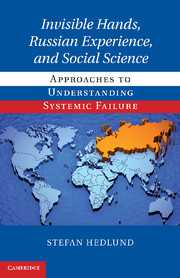 Invisible Hands, Russian Experience, and Social Science
Invisible Hands, Russian Experience, and Social Science Book contents
- Frontmatter
- Contents
- Preface
- Introduction
- 1 Opportunity and Self-Interest
- 2 Scope and Tradition of Social Science
- 3 Markets under Central Planning
- 4 Russia's Historical Legacy
- 5 Markets Everywhere
- 6 Institutional Choice
- 7 History Matters
- 8 Concluding Discussion
- 9 Implications for Social Science
- Bibliography
- Index
6 - Institutional Choice
Published online by Cambridge University Press: 01 June 2011
- Frontmatter
- Contents
- Preface
- Introduction
- 1 Opportunity and Self-Interest
- 2 Scope and Tradition of Social Science
- 3 Markets under Central Planning
- 4 Russia's Historical Legacy
- 5 Markets Everywhere
- 6 Institutional Choice
- 7 History Matters
- 8 Concluding Discussion
- 9 Implications for Social Science
- Bibliography
- Index
Summary
In his main presentation of institutional theory, Douglass North writes, “Institutions are the rules of the game in a society or, more formally, are the humanly devised constraints that shape human interaction.” There is obvious truth in this. Since time immemorial, humans have strived to regulate their relations to other humans by making rules. Beginning as unwritten codes, conventions, and norms, handed down by tradition, over time this rule making has become increasingly formalized and increasingly complex.
In a modern society, making and enforcing rules and regulations generates substantial employment, often at high incomes, in multiple professions across both the private and the public sectors. This said, one should not be lured into taking the continued reliance of many traditional societies on unwritten rules as a sign of lacking sophistication. As many anthropological studies have shown, the systems of informal norms that mark what is sometimes known as “primitive societies” can be highly sophisticated.
As we have argued, however, from a narrow perspective of economic efficiency there is clear empirical evidence that systems of formal rules, backed by credible and impartial third party enforcement, generate better economic performance than informal systems backed by social censure and sanctions. The contrast between north and south in Italy brings this point home, as does the broader contrast between Russia and the West.
- Type
- Chapter
- Information
- Invisible Hands, Russian Experience, and Social ScienceApproaches to Understanding Systemic Failure, pp. 167 - 196Publisher: Cambridge University PressPrint publication year: 2011


